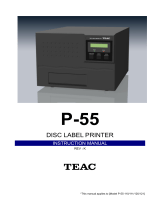
RESTRICTED USE ONLY Fargo Electronics, Inc.
DTC300/DTC300M Card Printer/Encoder User Guide (Rev. 2.2)
v
Using the Print Both Sides option____________________________________________________ 5-22
Using the Split 1 Set of Ribbon Panels option __________________________________________ 5-23
Using the Print Back Side First option ________________________________________________ 5-24
Using the Print Back Side Only option________________________________________________ 5-25
Using the Rotate Image 180 Degrees option ___________________________________________ 5-26
Using the Disable Printing option____________________________________________________ 5-27
Using the Device Options tab (DTC300M)_______________________________________________ 5-28
Adjusting the Ribbon Type option ___________________________________________________ 5-28
Selecting the Auto Ribbon Select option ______________________________________________ 5-29
Adjusting for the Resin Dither ______________________________________________________ 5-30
Using the Rotate Image 180 Degrees option ___________________________________________ 5-31
Using the Disable Printing option____________________________________________________ 5-32
Using the Resin Heat (K) option ____________________________________________________ 5-33
Using the Overlay Heat (O) option _____________________________________________________ 5-34
Using the Image Color tab (DTC300)___________________________________________________ 5-35
Using the Resin Heat (K) option ____________________________________________________ 5-36
Using the Overlay Heat (O) option___________________________________________________ 5-37
Using the Color Matching option and Default button_____________________________________ 5-38
Using the Calibrate tab ______________________________________________________________ 5-39
Using the Image Position Controls___________________________________________________ 5-40
Using the Sensors button __________________________________________________________ 5-42
Using the Settings button __________________________________________________________ 5-43
Using the Magnetic Encoding tab ______________________________________________________ 5-44
Using the Magnetic Track Selection radio buttons_______________________________________ 5-45
Using the Magnetic Track Options radio buttons________________________________________ 5-47
Using the Bit Density radio buttons __________________________________________________ 5-48
Using the Character Size radio buttons________________________________________________ 5-49
Reviewing the Enable MLE Support checkbox _________________________________________ 5-50
Using the ASCII Offset radio buttons_________________________________________________ 5-51
Using the LRC Generation radio buttons ______________________________________________ 5-52
Using the Character Parity radio buttons ______________________________________________ 5-52
Using the Shift Data Left checkbox __________________________________________________ 5-53
Reviewing the ISO Track Locations__________________________________________________ 5-54
Sending the Track Information______________________________________________________ 5-55
Entering the Track Information _____________________________________________________ 5-55
Reviewing Tracks 1, 2 and 3 (in table format) __________________________________________ 5-56
Reviewing the Track Data Note _____________________________________________________ 5-56
Reviewing the ASCII Code and Character Table________________________________________ 5-57
Using the Overlay / Print Area tab _____________________________________________________ 5-58
Using the Overlay / Print Area dropdown menu ________________________________________ 5-59
Using the Overlay / Print Area ______________________________________________________ 5-61
Using the Defined Area Option _____________________________________________________ 5-63
Using Security Options (Visual Security Solutions)______________________________________ 5-68
Selecting Orientation - Landscape under Card tab _______________________________________ 5-69
Selecting the Visual Security Solutions dropdown menu (A to D) __________________________ 5-70
Selecting Orientation - Portrait under Card tab _________________________________________ 5-71
Selecting the Visual Security Solutions dropdown menu (E to H)___________________________ 5-72
Selecting the VeriMark radio button _________________________________________________ 5-73
Selecting the HoloMark radio button _________________________________________________ 5-74
Reviewing the Custom VeriMark Card (Custom Graphic in a 2D foil) _______________________ 5-75
Reviewing the Custom HoloMark Card (Custom Graphic in a 2D foil) ______________________ 5-76
Using the K Panel Resin tab __________________________________________________________ 5-77
Selecting from the Print All Black With K Panel options _________________________________ 5-78
Selecting the Full Card option ______________________________________________________ 5-79
Selecting the Defined Area(s) option _________________________________________________ 5-80
Selecting the Undefined Area(s) option _______________________________________________ 5-81
























